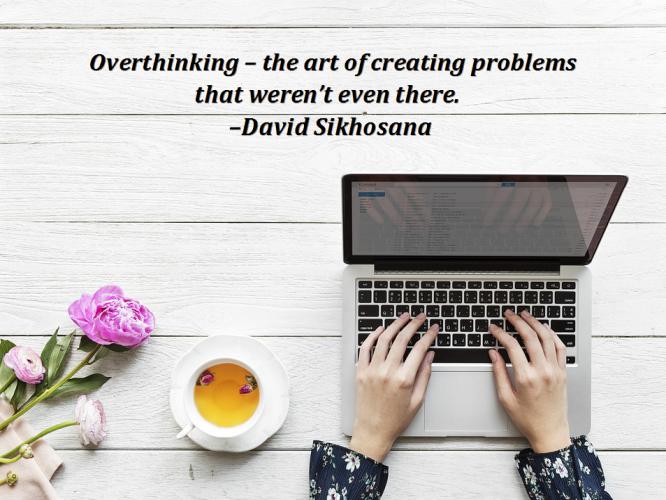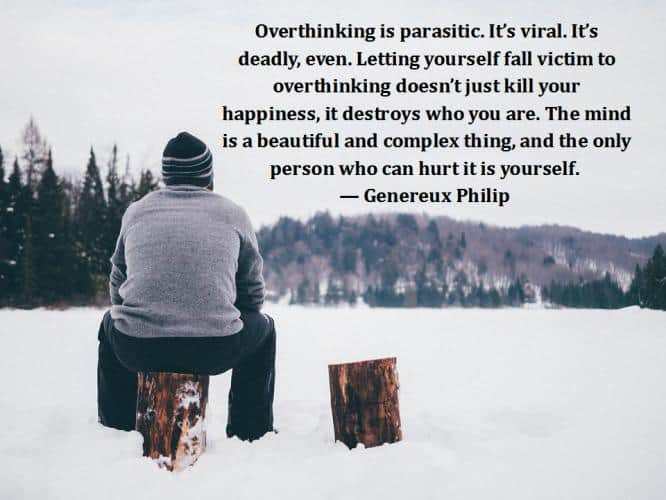Do you know how many thoughts an average human brain thinks per day?
Well, the answer is:
National Science Foundation published an article in 2005 stating that as per research an average person has 12,000 to 60,000 thoughts per day. Out of these, it was found 80% of the thoughts were negative ad 95% were repeated as the earlier days.
Now that you know the above, you should know that human beings have a tendency to think negative.
As per a study conducted by Leahy, Study of Cornell University, scientists found 85% of our worries never materialize. Moreover, 15% of the worries that actually happened in reality – taught the subjects – either that they were better able to handle the difficulty. In addition to that, they also found that the difficulties faced taught the subjects – lessons worth learning.
Therefore, our worries (97% of them) have no base and originate from “unfounded pessimistic perception.”
7 Effective Tips to Stop Overthinking and Start Living
Did I leave the lights on? How will I complete my deadline tomorrow? Will my boss yell at me in front of everyone at the meeting? Is he going to call me back? Does she miss me? How could I say something so stupid?
These are all results of overthinking. We as individuals at some point in our lives, overthink about our past decisions and how we could have done it differently. This leads to all the negative emotions one can feel such as regret, guilt, anxiety, stress, and frustration. Overthinking leads to a point of driving yourself crazy. It creates worrying thought that builds up into this hurricane of thoughts that disturb your mind and emotionally break you down. You are filled with assumptions and judgments without knowing what the real deal is.
According to Buddhism and Western Psychology, it’s all about learning the art of acceptance, reframing and letting go that stops overthinking.

A Journey of How to Overcome Overthinking and Start Living
Being an overthinker myself, the hardest thing to do is to stop overthinking about every little thing around me. I constantly used to play my past decisions in my head like a recorder and sit and sulk about how I could do it differently. The thought of it made me cringe all the time. I suffered from anxiety, stress, lack of sleep, weight gain that affected my mental health.
Thoughts like, “I should have not left my job, I would be happier if I stayed longer.” or “My parents must be disappointed with me. I am not good enough.” I kept ruminating about my past constantly.
To add more drama to my life, I used to overthink about everything that was part of my daily routines such as my work or my relationships. I thought things like, “How will I handle the event at the hotel tomorrow, I will embarrass myself and ruin a guest’s dish or drink.” or “My boyfriend will find someone better because I don’t look pretty enough.” I drove myself crazy and kept wanting confirmation from the people I love. an assurance that what I thought was not true. However, I still would not be fully satisfied with their answers and constant assurances.

That is when I realized that what was the point of overthinking when it never turned out true. Why was I putting myself through so much misery and not able to stop overthinking? I had to understand that this was all related to my past and I had to let it go. Learning the art of acceptance, forgiving, self-love and letting go has helped me massively to stop overthinking and over-analyzing everything. Moreover, I learned some strategies to overcome overthinking that helped me ease my stress and anxiety levels.
The Dangers of Overthinking
Overthinking is a nuisance but at the same time, it takes a negative toll on your well-being. Overthinking leaves you in constant anguish.
Research tells us that constantly thinking about your shortcomings or mistakes increases your mental health problems and creates a vicious cycle that is hard to breakthrough. Studies also show that overthinking leads to serious emotional distress. To escape it, many people resort to unhealthy ways such as alcohol and food. Emotional binge eating becomes a way to put off this problem. It also leads to poor quality of sleep as your mind won’t shut off.

1. Be aware of overthinking
Before you begin to change your ways to stop overthinking, you need to learn how to be aware of when overthinking takes place. When you begin to feel stressed or start doubting your thoughts, stop and pause for a while. Think about the situation and how you are responding to it. Because many times, you tend to come to a conclusion without thinking about your situation since you are in an anxious state. Thus, acknowledge that your thoughts aren’t productive and take control of it.
Ask yourself, will this matter in the next five years or even in a few months. If not, then stop overthinking and put things into perspective.
2. Don’t think ONLY of what can go wrong
In many situations, it is fear that takes over your mind and triggers the mind to overthink everything negative. Whether it is you failed in the past or are scared to try something new or attempting the same thing that you once failed in. When these negative emotions take over, you feel confused and demotivated. Thus, remember that even though things did not work out earlier, does not mean that there won’t be a positive result or outcome.
Visualize all the things that can go right and keep those thoughts present and up front. Change your view of fear and always remember that every opportunity is a new beginning, a place to start again.

3. Set a timer
Set a timer or give yourself a time-limit to view your problems or situation from different angles and perspective. Learn to become better at making decisions and take action by setting deadlines in your daily life. No matter how small or big your decision is.
You can also spend 10 minutes writing down all the things that are causing you stress, worry or anxiety. Soon after, tear the paper and throw it away. Move on from those situations and do something fun to distract your mind. Let it rip. When the 10 minutes is up, throw the paper out and move on–preferably to something fun.
For small decisions like if you should go and do the dishes or respond to an email or simply work out. Give yourself 30 seconds or less to make a decision. For larger decisions, use a deadline for 30 minutes or take an entire day.
4. Practice Meditation
When you are in doubt or can’t stop overthinking about your situation, then practice meditation. This is a perfect time to focus your mind and get rid of all the thoughts that are holding you back.
When you practice meditation regularly, you will notice that you no longer get caught up in overthinking. Instead, you refocus on the present moment and let go off the past and future. Meditating can literally bring amazing changes to your brain.
5. Stop all assumptions
To stop overthinking you need to stop having all kinds of assumptions that never turn out true in reality. Constantly reminding yourself that calling in sick at work is going to get you fired, or that forgetting one deadline is going to cause you to become homeless is exaggerated assumptions. You end up training your brain to think of the worst and how it will ruin your life.
To stop assuming or judging, stop and analyze the situation by either confronting the person or problem. Talk to a friend on how you feel and this will help you to calm down. Shifting your mindset to a positive outlook will help a lot.
To Understand the Power of your Subconscious Mind read the Book

6. Take out “Me” time to Stop Overthinking
Keep sometime just for yourself to stop overthinking During this time, avoid any kind of overthinking that increase your stress and anxiety. Instead, focus on what makes you happy. Do the things that shift your focus from everything negative to happier feeling thoughts.
Unplug from all kinds of electronics –
Phone, tabs, social media, email or phone calls. Instead, read a book, go for a walk or just gaze at something beautiful and dream. Do this each day – while on the subway or walking to the Uni, taking a break between weekend grocery shopping.
Do something creative –
Doesn’t mean you create a piece of art. Just do anything like doodle a sketch, cook a meal, bake, draw, color a coloring book or just repair that old watch. Don’t bother about the outcome. Just enjoy the process.
Identify what you love to do and do it-
If you like playing football or music find a nearby club where you could go every week or fortnight. If you love reading, keep a book in your bag or save it on your tab, read it when you are waiting for a meeting or at the dentist.
Take a much-needed Nap-
Sleeping is like healing your brain. Light a diffuser with essential oils to create a positive aura if you have trouble sleeping. Follow our instructions on how Yoga helps you sleep.
Yoga for Sleep – Sleep Poses and Benefits
Pamper yourself-
Take yourself for lunch or dinner or coffee. Indulge in the taste and just gaze at the people around, or listen to your music by your earphones plugged in, go on a solo one day holiday, join a laughter club. Do this middle of the week when there is a baby sitter at home and escape the routine.
Meet up or call a friend or find a new friend-
Meeting up with people who bring your smile and laughter is the best medicine for overthinking brain. Indulge in silly laughs, go for a fun activity with complete strangers and enjoy meeting new people. Make sure you do not end up talking or repeating what you have been overthinking about.

7. Practice Acceptance and Mindfulness
Running behind perfectionism can sometimes be a curse. Having no control over the way you want things to be done can cause frustration, anger, and anxiety. This is where we need to learn mindfulness and acceptance. Tell yourself that you have to accept the way things are and need to move on.
Practicing both acceptance and mindfulness can be extremely difficult but it helps to stop overthinking. When things don’t go your way, take it as a lesson for the good. Learn to be thankful and think of the blessings bestowed on you. Every coincidence, mishap or problem has a good reason and lesson behind it. So, do not think about yesterday or worry about the future, instead, live and enjoy today.
Thank you for the Gratefulness

Change your ‘CANTS’ into ‘CANS’
You ‘CAN’ Stop Overthinking
We all get caught up in moments of worrying, obsessive planning, and perfecting everything. It can feel even worse when you are stressed out or struggling with anxiety. It gets harder especially if you are struggling with an anxiety disorder. Do not put pressure on yourself.
Take things slow and remind yourself that change will happen but it will need patience and determination. Overthinking will change nothing but only cause you pain. So, Stop, Think and Analyze!
Let us know in the comments below if you have any more tips for how to stop overthinking!
People who read the above also saw:
10 Best Anxiety Management Techniques
7 Ways to Deal with a Job Loss – Emotionally
8 Ways to attract Good Energy in your LIFE every day
How Super Stars Beat Depression
3 Ways to Chant Om Properly
How to know what you feel is Selfish or Self-Love?
http://wordpress-334546-1028402.cloudwaysapps.com/kundalini-yoga-benefits-meaning-wellnessworks/







